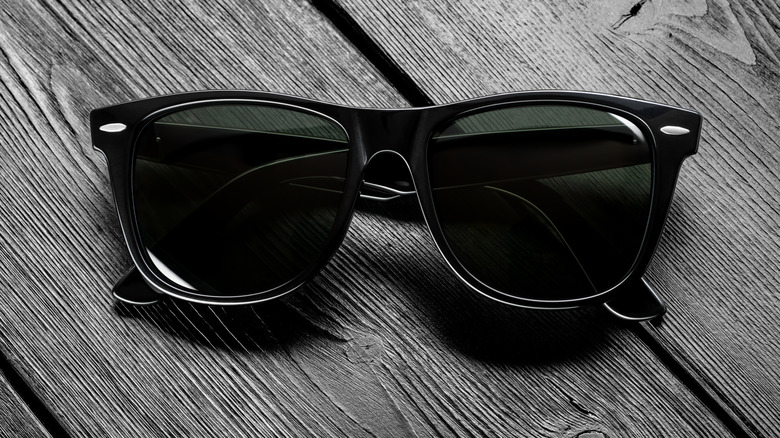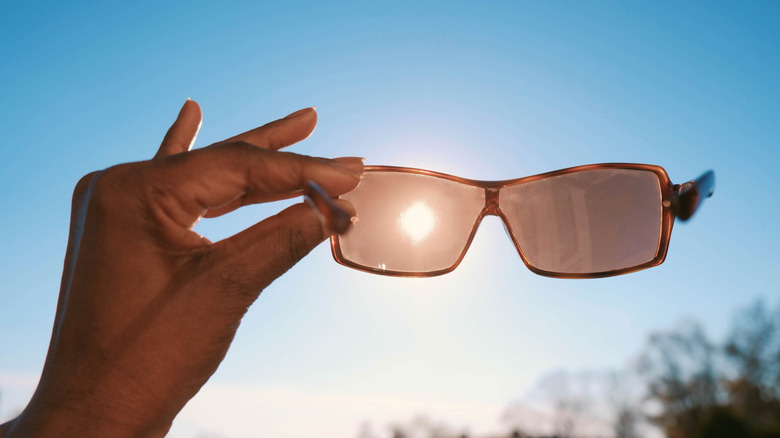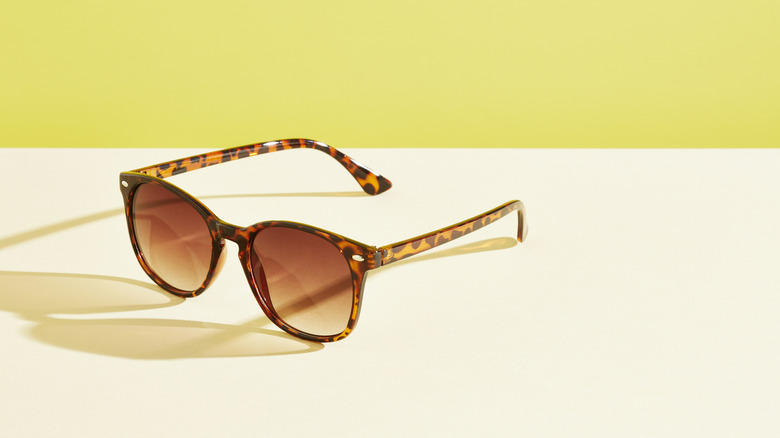The Myth About Sunglasses You Shouldn't Believe
There are quite a few counterintuitive facts about life. Leaving aside quantum mechanics, which explains how things get about as counterintuitive as possible on a subatomic scale, there's more simple examples such as the typical cloud weighing 1.1 million pounds, or the fact that drinking a hot drink on a hot day can cool you down. Or how about the fact that your dark sunglass lenses may not be as good at protecting your eyes from the sun as lighter lenses.
It's not entirely clear when sun-shading eyewear first emerged, but some estimates suggest we've been wearing such protective accessories for 2,000 years. It wasn't until the 1760s, however, that shades emerged as a fashion accessory. The first mass-produced sunglasses then debuted on New Jersey's Atlantic City boardwalk in 1929, with entrepreneur Sam Foster selling the inexpensive eyewear to the crowds. Ever since, shades have truly become ubiquitous. As such, not everybody necessarily cares about sunglasses' ability to provide health benefits, but we probably should, especially since the facts of protective eyewear are quite counterintuitive when you get down to it.
Darker shades might do more harm than good
When choosing sunglasses, the overall look and fit is typically what most people consider. That said, we're all aware that polarization of light is also a major consideration. Most sunlight that reaches our eyes is scattered due to it reflecting off uneven surfaces. But sunlight that reflects off a smooth surface, such as a still body of water, is not scattered and shines in one direction, resulting in glare that could potentially damage our eyes. Polarized lenses are designed to reduce this glare. They are made with a chemical coating which allows them to filter light through vertical openings, restricting horizontal light waves from making it through. This vastly reduces glare and the danger that comes with it, though it should be noted that polarization isn't the same as blocking the sun's harmful ultraviolet (UV) rays.
If your sunglass lenses aren't polarized, then unfiltered light can make its way directly into your eyes. Even if you wear dark sunglasses, you're not necessarily getting the best protection from the sunlight. In fact, wearing a pair of light sunglasses with polarization will provide much more protection against glare than darker shades without polarization.
But what might really surprise you is that darker glasses could do harm to your eyes simply by virtue of being dark. That's due to the fact they cause your pupils to widen more than lighter alternatives, exposing your eyes to more glare and potentially harmful UV rays than if you were to wear lighter shades. Over time, UV light exposure can increase your risk for cataracts, macular degeneration, and a cancer known as ocular melanoma. As such, opening your pupil wider than it might otherwise be isn't really the best approach, but it turns out that things might not be as simple as "darker glasses widen your pupil, therefore they're more dangerous than lighter ones."
Are darker sunglasses bad for you or not?
To put it simply, the shade or darkness of your sunglasses isn't an indication of their ability to protect your eyes. Rather, it's the coatings that really matter. Despite the fact that darker shades do cause your pupils to widen, research on this phenomenon have determined that there's a more important consideration when it comes to eye damage from UV light.
A 2024 study published in Scientific Reports notes how there is no existing literature to support the idea that pupil dilation can lead to a greater influx of UV light into the eye. Researchers measured the amount of this light passing through the pupils of participants when they were wearing sunglasses and when they were not. 214 sunglass lenses were tested, with the results showing that pupil dilation actually doesn't play an important role in the amount of UV light passing through the eye. In fact, field-of-view was identified as the most significant factor in this equation, contributing to the UV light influx 314.3% more than pupil dilation.
Still, informed commentators have argued that pupil dilation due to dark sunglasses is something to consider. Speaking to the Columbia University Irving Medical Center, Dr. Tongalp Tezel, head of the retina service in the Department of Ophthalmology at Columbia University, stated that "pupils dilate when light is dim or you're wearing dark sunglasses. That creates a bigger area for UV to access the eye. If the lenses are simply colored and do not block UV, you're opened up to eye damage." Whatever your own take, it's clear that the coatings are the most important element to consider when it comes to sunglasses protecting you from harmful light.


